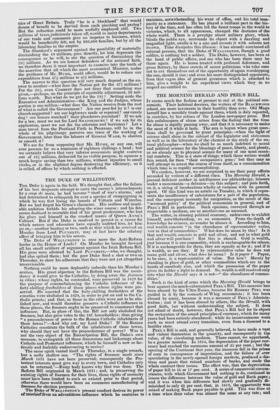THE DUKE OF WELLINGTON.
THE Duke is again in the field. We thought that, after the failure of his last desperate attempt to carry the enemy's intrenchments by a coup de main, he had become "tired of war's alarms," and had determined to relinquish for ever a species of campaigning in which he was fast losing the laurels of Vittoria and 'Waterloo. But we had forgot his Grace's character. His restless and insati- able ambition forbids his adopting the wiser course; and his fate seems destined to resemble that of his great predecessor, who lost his glory and himself in the crooked mazes of Queen ANNE'S Cabinet. But if the Duke is resolved to persist in a career for which nature and education have equally unfitted him, let him go on,—another beating or two, such as that which he received on Monday from Lord PLUNKETT, may at last have the salutary effect of bringing him to his senses. The Duke of WELLINGTON is once more the Anti-Reform leader in the House of Lords ! On Monday he brought forward all his small artillery of argument against the Irish Reform Bill. His guns were silenced by Lord PLUNKETT,—who, we thought, had also spiked them ; but the poor Duke fired a shot or two on Thursday, to show his adherents that they were not yet altogether unserviceable.
Nothing could be more deplorably imbecile than his Monday's oration. His great objection to the Reform Bill was the ascen- dancy it would give to the Catholics, by doing away the freemen in cities; whose rights, he contended, were preserved in 1829 for the purpose of counterbalancing the Catholic influence of the forty-shilling freeholders of those places whose rights were pre- served. He asserted that the forty-shilling freeholders of the counties were abolished in 1829, in order to put an end to the Ca- tholic priests; and that, as those in the cities were not to be abo- lished now, and would therefore preserve a Catholic influence in those places, the freemen ought to be preserved to counteract that influence. But, in place of this, the Bill not only abolished the freemen, but also gave votes to the 10/. householders; thus givino. "a preponderance of power to the Roman Catholic inhabitants of those towns V'—And why not, my Lord Duke? If the Roman Catholics constitute the bulk of the inhabitants of those towns, Why should they not have the preponderance of power? Was it not the very object of the .Emancipation Bill, the Duke's own measure, to extinguish all those dissensions and bickerings about Catholic and Protestant influence, which he himself is now so fac- tiously and foolishly endeavouring to revive? 'The same spirit vented itself on Thursday, in a single remark, but a sadly shallow one. "The rights of freemen made since March 1831 have not been preserved; consequently the Pro- testant interests must give way in every town, and Catholics only cah be returned."—Every body knows why that was done. The Reform Bill originated in March 1831; and, in preserving the existing rights of freemen for their lives, those rights of necessity Must have been limited to such as existed prior to that period, otherwise there would have been an enormous manufacturing of fteemenfor election purposes. The Duke of WELLINGTON'S present conduct derives its power amisehiefSrom an adventitious influence which he contrives to maintain, notwithstanding his want of office, and his total inca- pacity as a statesman. He has played a brilliant part in the his- tory of the time, and has often led the finest troops in the world to victories, which, to all appearance, changed the destinies of the whole world. There is a prestige about military glory, which blinds the public eye, surrounds its object with a dazzling and magnified light, swells it to a size and invests it with colours not its own. Time dissipates this illusion : it has already convinced all rational persons, that the Duke of WELLINGTON, though a good soldier, is nothing but a soldier. The Duke, however, has been at the head of public affairs, and one who has been there may be there again. He is hence treated with profound deference, and gross flattery, by those crowds of minor politicians who take care not to cut themselves out of the opportunity of again worshipping the sun, should it rise; awl even his more distinguished opponents, from that vague idea of general greatness which is attached to him, give a weight to his superficial views which they in no respect are entitled to.


























 Previous page
Previous page